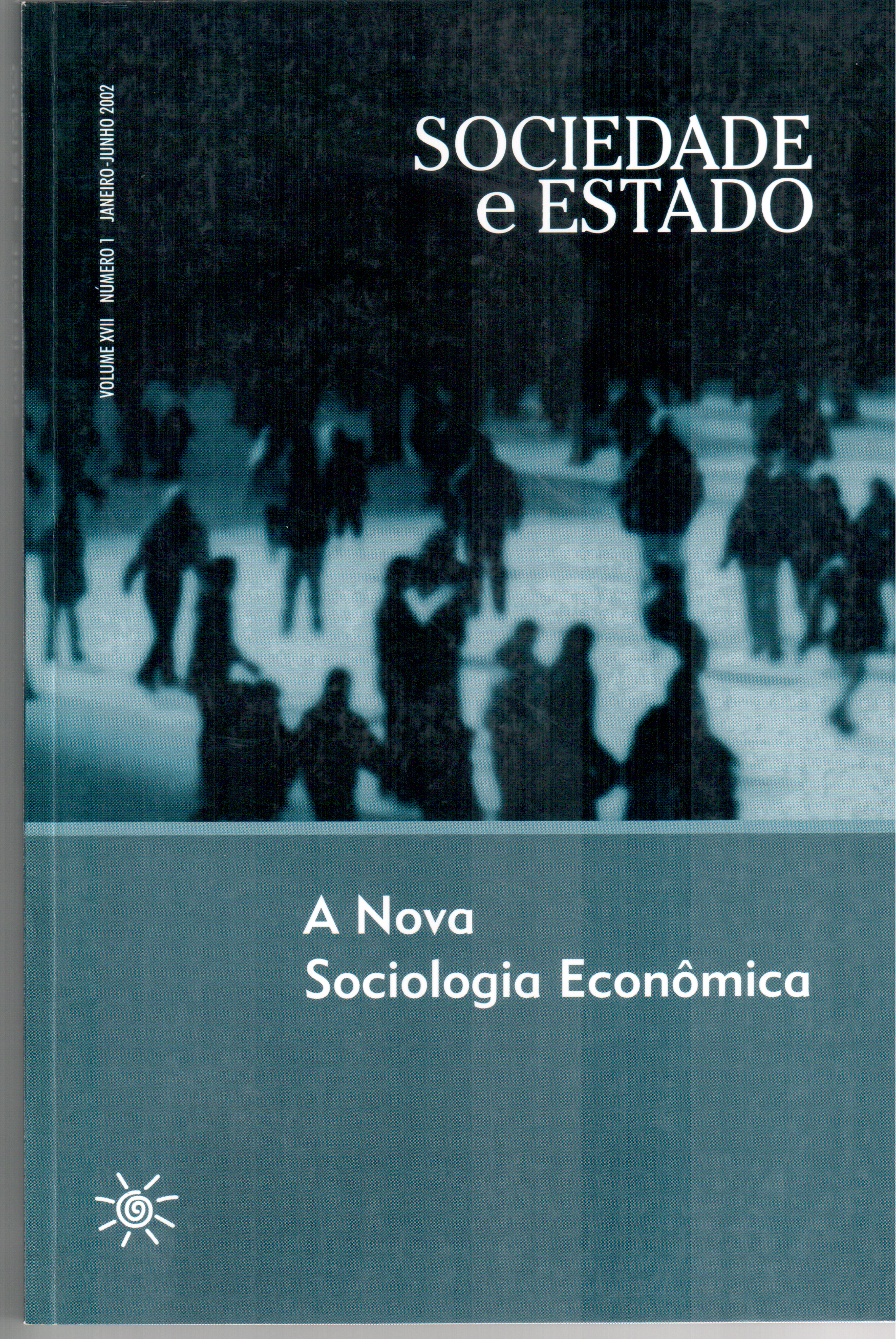Distributing intelligence and organizing diversity in new media projects
Palavras-chave:
empresas de web design, Sociologia EconômicaResumo
Este artigo examina como as empresas de web design
exploram e experimentam formas e fontes de valor que configuram a
nova economia. Centrando o foco na engenharia cooperativa de equipes
transdisciplinares de web design, examina-se a emergência de sites
como acordos provisórios entre disciplinas heterogêneas, na medida
em que negociam soluções de compromisso entre critérios de
desempenho em competição
Referências
BARKER, James R. The discipline of teamwork: participation and concertive
control. Thousand Oaks: SAGE, 1999.
BOCZKOWSKI, Pablo. Affording flexibility: transforming information
practices in online newspapers. PhD Dissertation, Department of
Science and Technology Studies, Cornell University, 2001.
BOLTANSKI, Luc; THEVENOT Laurent. De la justification: les economies
de la grandeur. Paris: Gallimard, 1991.
______. The Sociology of critical capacity. European Journal of Social
Theory, v. 2, n. 3, p. 359-377, 1999.
BROWN, John Seely; DUGUID, Paul. Organizing Knowledge. California
Management Review, 1998.
CLIPPINGER, John. Tags: the power of labels in shaping markets and
organizations. In: CLIPPINGER, John (Ed.). The Biology of business:
decoding the natural laws of enterprise. San Francisco: Jossey-Bass,
p. 67-88.
GALISON, Peter. Image and logic: a material culture of Microphysics.
University of Chicago Press, 1997.
GARUD, Raghu; KARNOE, Peter. Distributed and Embedded Agency in
Technology Entrepreneurship: Bricolage vs. Breakthrough.
Unpublished manuscript. Stern School of Business, New York
University, 2001.
GRABHER, Gernot. Adaptation at the cost of adaptability? restructuring the
Eastern German Regional Economy. In: GRABHER, Gernot; STARK,
David. Restructuring networks: legacies, linkages, and localities in
Postsocialism. London and New York: Oxford University Press, 1997.
p. 107-134.
GRABHER, Gernot; STARK, David. Organizing diversity: evolutionary theory,
network analysis, and postsocialist transformations. In: GRABHER,
Gernot; STARK, David. Restructuring networks: legacies, linkages,
and localities in Postsocialism, London and New York: Oxford
University Press, 1997. p. 1-32.
HAGSTROM, Peter; HEDLUND, Gunnar. A three-dimensional model of
changing internal structure in the firm. In: CHANDLER, Alfred;
HAGSTROM, Peter; SOLVELL, Orjan (Eds.). The dynamic firm: the
role of technology, strategy, organization and region. Oxford
University Press, 1998. p. 166-191.
HANNAN, Michael T. Uncertainty, diversity, and organizational change. In:
SMELSER, Neil; GERSTEIN, Dean R. Behavioral and social
sciences: fifty years of discovery : in commemoration of the fiftieth
anniversary of the “Ogburn report”. Washington, D.C.: National
Academy Press, 1986. p. 73-94.
HENNION, Antoine. Baroque and rock: music, mediators and musical taste.
Poetics, n. 24, p. 415-435, 1997.
HUTCHINS, Edwin. Cognition in the wild. Cambridge, Mass: MIT Press,
HUTTER, Michael; TUBNER, Günther. The parasitic role of hybrids. Journal
of Institutional and Theoretical Economics, v. 149, n. 4, p. 706-715,
KAIT, Casey; WEISS, Stephen. Digital hustlers: living large and falling hard
in Silicon Alley. New York: HarperCollins, 2001.
KAUFFMAN, Stuart A. Adaptation on rugged fitness landscapes. In: STEIN,
D. (Ed.). Lectures in the Science of Complexity. Reading, MA: Addison-
Wesley, Longman, 1989. v. 1, p. 527-618.
KNIGHT, Frank H. Risk, uncertainty, and profit. Boston: Houghton Mifflin,
KOGUT, Bruce; SHAN, Weijan, WALKER, Gordon. The make-or-cooperate
decision in the context of an industry network. In: NOHIRA, Nitin;
ECCLES, Robert G. (Eds.). Networks and organizations. Cambridge,
MA: Harvard Business School Press, 1992. p. 348-365.
LANE, David; MAXFIELD, Robert. Strategy under complexity: fostering
generative relationships. Long Range Planning. v. 29, n. 2, p. 215-31,
LATOUR, Bruno. Powers of association. In: LAW, John (Ed.). Power, action,
and belief: a New Sociology of Knowledge. Routledge, 1986. p. 264-
_______. Technology is Society made durable. In: LAW, John (Ed.). A
Sociology of monsters: essays on power, technology, and domination.
Routledge, 1991. p.103-131
MARCH, James G. Exploration and exploitation in organizational learning.
Organization Science, v. 2, n. 1, p. 71-87, 1991.
MEYERSON, Debra; WEICK, Karl E.; KRAMER, Roderick M. Swift trust
and temporary groups. In: KRAMER, R. M.; TYLER, T. R. (Eds.)
Trust in organizations. Thousand Oaks: SAGE, 1996. p. 166-195.
NEW YORK NEW MEDIA ASSOCIATION. 3rd New York New Media
Industry Survey. 2000.
PADGETT, John; ANSELL, Christopher. Robust action and the rise of the
Medici, 1400-1434. American Journal of Sociology, n. 98, p. 1259-
, 1993.
POWELL, Walter W. Inter-organizational collaboration in the Biotechnology
Industry. Journal of Institutional and Theoretical Economics 152:197-
, 1996.
PRATT, Andy C. New media, the new economy, and new spaces. Geoforum,
n. 31, p. 25-436, 2000.
SABEL, Charles F.; DORF, Michael C. A Constitution of democratic
experimentalism. Columbia Law Review, v. 98, n. 2, p. 267-529, 1998.
SABEL, Charles. Moebius-strip organizations and open labor markets: some
consequences of the reintegration of conception and execution in a
volatile Economy. In: BOURDIEU, Pierre; COLEMAN, James (Eds.).
Social theory for a changing society. Boulder, Colo., and New York:
Westview Press and the Russell Sage Foundation, 1990. p. 23-54.
STAR, Susan Leigh; GRIESEMER, James. Institutional Ecology, translations,
and boundary objects: amateurs and professionals in Berkeley’s
Museum of Vertebrate Zoology, 1907-1939. Social Studies of Science,
n. 19, p. 387-420, 1989.
STARK, David. Heterarchy: distributing intelligence and organizing diversity.
In: CLIPPINGER, John (Ed.). The Biology of business: decoding the
natural laws of enterprise. San Francisco: Jossey-Bass Publishers,
p. 153-179.
_______. For a Sociology of Worth. Unpublished manuscript. Center on
Organizational Innovation, Columbia University. Paper prepared for a
keynote address at the Annual Conference of the European Association
of Evolutionary Political Economy, Berlin, November 3, 2000. http:/
/www.sociology.columbia.edu/downloads/other/dcs36/
sociology_worth.pdf
THEVENOT, Laurent. Rules and implements: investment in forms. Social
Science Information, v. 23, n. 1, p. 1-45, 1984.
THOMPSON, E. P. Time, work-discipline, and industrial Capitalism. In:
GIDDENS, Anthony; HELD, David (Eds.). Classes, power, and
conflict. Berkeley: University of California Press, 1982. p. 299-309
WEICK, Karl E. Organization design: organizations as self-designing systems.
Organizational Dynamics, v. 6, n. 2, p. 31-45, 1977.
Downloads
Publicado
Edição
Seção
Licença
Copyright (c) 2022 Revista Sociedade e Estado

Este trabalho está licenciado sob uma licença Creative Commons Attribution-NonCommercial 4.0 International License.











